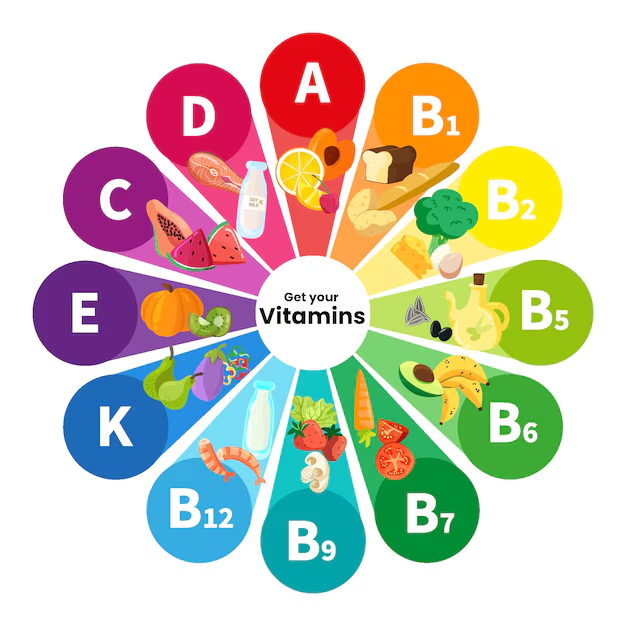Vitamins and minerals are vital to our body’s Optimal Health overall health and well-being, providing essential immune support, metabolic regulation and physical and mental wellbeing.
Vitamin A provides skin health, vision and immune support while vitamin C boosts our immunity while aiding iron absorption. Finally, Vitamin D also known as “the sunshine vitamin” plays an essential role in strong bones and teeth as well as calcium absorption by our bodies.
1) Vitamin A

Vitamin A is an essential fat-soluble vitamin necessary for healthy vision, growth and development, immune function and the maintenance of skin and mucous membrane health, red blood cell production as well as maintaining overall wellness. There are two forms of Vitamin A; preformed A found in animal products like liver and dairy while provitamin A found in plant foods such as carrots, sweet potatoes, spinach and other leafy green vegetables.
2) Vitamin B
B vitamins play an integral part in energy metabolism, red blood cell formation and maintenance, brain function and the synthesis of DNA and RNA synthesis. They can be found in foods like meat, poultry, fish, whole grains, beans nuts and leafy green vegetables; deficiency of any one or more B vitamins may lead to serious health consequences depending on which specific vitamin(s) is lacking.
3) Vitamin C
Vitamin C, also known as ascorbic acid, is a water-soluble vitamin essential to many bodily processes. As an antioxidant it helps protect cells against damage caused by harmful molecules known as free radicals; furthermore it plays a key role in collagen formation which is vital to maintaining skin, bone and connective tissue health. Vitamin C can be found naturally in fruits and vegetables such as citrus fruits, strawberries, kiwi papaya broccoli Brussels sprouts red bell peppers as well as available as dietary supplements.
4) Vitamin D
Vitamin D is an essential fat-soluble vitamin with many bodily functions. It’s necessary for the absorption of calcium and phosphorus – essential ingredients needed for the development and maintenance of healthy bones and teeth – as well as helping regulate immunity. Studies suggest it may even have preventive benefits against certain cancers, autoimmune diseases and other health conditions. It can be obtained through sunlight exposure as well as from foods like fatty fish, egg yolks and fortified dairy products or taken as dietary supplements.
5) Vitamin E

Vitamin E is a fat-soluble vitamin that serves as an antioxidant in the body. It helps protect cells from damage caused by free radicals and may even have anti-inflammatory effects, as well as playing an essential role in immune function, DNA repair, immune responses and other bodily processes. You can find Vitamin E in food such as nuts and seeds, vegetable oils, green leafy vegetables and fortified cereals; you may also take supplements. Deficiencies may occur rarely but symptoms could include muscle weakness, vision problems and nerve damage.
6) Vitamin K
Vitamin K is a fat-soluble vitamin essential for blood clotting and bone health. There are two forms of this essential nutrient: K1 or phylloquinone can be found in leafy green vegetables like spinach, kale and broccoli while menaquinone is produced by bacteria in your gut and found in fermented products like cheese and natto. Vitamin K plays an essential role in blood clotting processes following injury as well as activating proteins involved with maintaining strong bones.
7) Optimal Health Calcium
Calcium is an essential mineral for building and maintaining strong bones and teeth, as well as being involved in muscle function, nerve transmission and blood clotting. Calcium can be found in various food products such as dairy such as milk cheese yogurt etc; leafy green vegetables nuts fortified cereals as well as supplements available as calcium is found naturally throughout nature and available as dietary supplements too. A lack of calcium intake may lead to osteoporosis with its associated brittle and fragile bones as well as muscle cramps tingling sensations or symptoms being experienced from such conditions resulting in bone fragility brittleness brittleness being felt within.
8) Iron
Iron is an essential mineral essential to producing hemoglobin, the protein found in red blood cells which transport oxygen throughout the body. Iron also plays an essential role in many enzymes and other proteins within our bodies, and is found both as animal-based foods (heme iron) as well as plant-based sources like beans, lentils and fortified cereals.
9) Magnesium

Magnesium is an essential mineral, required for many bodily processes such as muscle and nerve function, energy production and maintaining strong bones and teeth. Magnesium also plays a vital role in heart rhythm regulation as well as blood sugar management.
You can find magnesium-rich foods such as leafy green vegetables, nuts, seeds whole grains legumes as well as supplements containing magnesium. A deficiency can cause muscle cramps tremors irregular heart rhythms as well as certain medical conditions like gastrointestinal disorders or kidney disease leading to magnesium deficiency.
10) Zinc
Also Refer:- The 9 Benefits of Doing Yoga: How to Live a Healthier and Happier Life
Zinc is an essential mineral involved in numerous bodily processes, including immunity, protein synthesis, wound healing and DNA synthesis. Additionally, zinc helps with sense of taste and smell. You can find zinc-rich foods like oysters, beef, pork, poultry, beans nuts and whole grains; additionally, supplements are available as dietary sources.
Zinc deficiency can cause impaired immunity, delayed wound healing and growth retardation among children – particularly common among people suffering from malabsorption syndromes or sickle cell disease.



